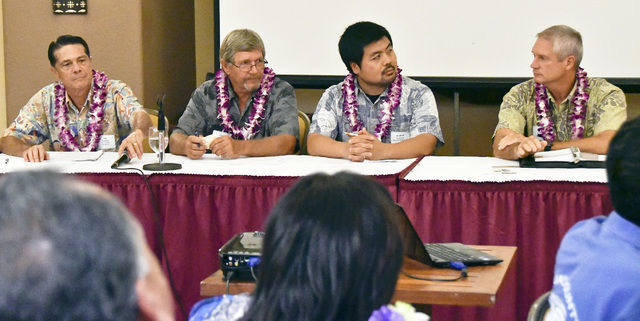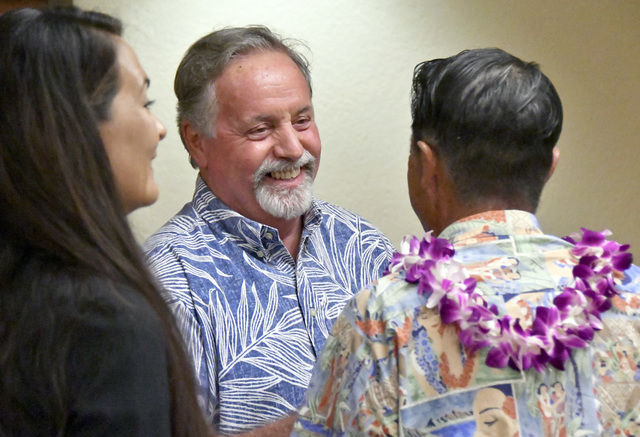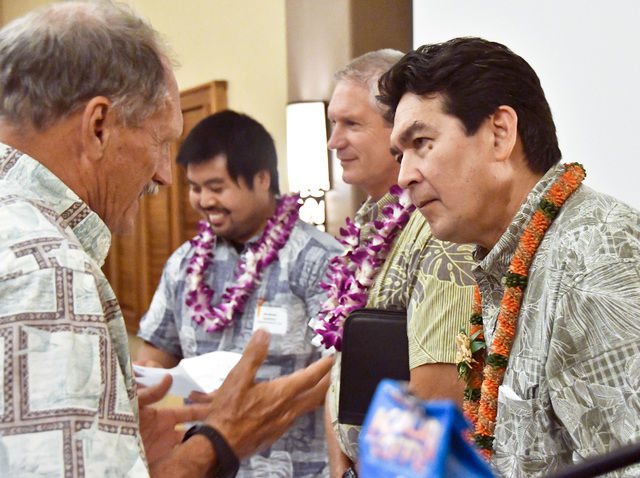Worldwide, agriculture is going through a massive adjustment and the industry on Kauai has to evolve as well in order to keep up. Which direction to grow, however, is up for debate. Paul Brewbaker, economist with TZ Economics, presented the
Worldwide, agriculture is going through a massive adjustment and the industry on Kauai has to evolve as well in order to keep up.
Which direction to grow, however, is up for debate.
Paul Brewbaker, economist with TZ Economics, presented the state of the ag industry at Thursday evening’s Outlook on Farming hosted by Kauai County Farm Bureau and the Kauai Chamber of Commerce.
Falls in commodity pricing, oil, corn ethanol, and sugar have cascaded together to majorly affect the entire ag industry, he said to about 150 people at the Courtyard Marriott Kauai at Coconut Beach.
“So here you are out in Waimea or Kekaha and you’re working out in the corn field, you’re wondering how has this become part of my life?” Brewbaker said. “When you put all of that together (commodity price drops), you get major industry realignment.”
The value of the seed industry, for example has fallen from a $240 million industry at its peak to its current value at $150 million.
“For the seed industry, that’s happening as a backdrop for other massive changes in Hawaii agriculture,” Brewbaker said. “It’s not just the corn pricing, but that’s been the big driver lately.”
The other factor affecting the industry, he explained, is that it has matured and is adjusting to being a full-fledged industry.
Brewbaker was one of five presenters at the meeting and was joined by John Gordines, vice president of Kauai County Farm Bureau and owner of Tropical Flowers Express; Jerry Ornellas, owner of Jerry’s Farm — primarily an orchard, Joshua Uyehara, site manager for Syngenta Kauai, and Fred Cowell, general manager for Kauai Coffee.
Each panelist offered insights on three topics: the current state of their specific ag industry, the issues facing those within their realm, and the future of farming.
In attendance was Councilwoman Joann Yukimura, who said she thought good ideas were floated on the topic.
“There were, however, some important players and interests missing from the panel and the discussion — young farmer-entrepreneurs,” she said.
She said organic farms should have been represented.
“As we know, organic produce is one of the fastest-growing sectors of food sales,” Yukimura said.
Geoff Morris, known as the GMO Reaper in his costume, crashed the meeting to protest the presence of the seed industry on the island.
The GMO Reaper left voluntarily after a demonstration that lasted less than a minute, with Councilman Mel Rapozo and Mayor Bernard Carvalho Jr. on his heels.
“I told them (the panelists) they need to look at the pesticide issue and that they’re poisoning the island. They need to look in the mirror,” Morris told TGI Friday. “If you’re going to talk about the future of farming, you have to include the organic farmers (in the discussion.)”
He said he was already leaving the room when Rapozo and Carvalho moved to escort him out and he “wasn’t forced out or taken out by security.”
After Morris left the room, Uyehara was asked about the issues facing the seed industry today.
“I think we just saw one of them,” he said.
Agriculture isn’t part of the community like it was 50 years ago, he said, and the public doesn’t understand the industry because the prevalence of farmers is dwindling.
“Previously, the farming community was the community, but that’s not so much the case anymore,” Uyehara said. “Most people will never interact in a direct way with a farmer.”
In addition to educating the community about their activities, Uyehara said the seed industry on Kauai faces challenges like maintaining an aging irrigation infrastructure and the lack of available land.
“As land gets more rare, cost goes up and other things associated with land cost — the water and the infrastructure,” Cowell said.
Another challenge is a shortage and high cost of farm labor.
“We’re in an extremely tight labor market and your agricultural workers are being sought by different industries — hotels, restaurant, construction, you name it,” Cowell said.
The key to turning that part of the ag industry around is recruitment and education, Gordines said.
“We need to kick it up a notch,” he said. “We have the land, we have the resources, we just need the warm bodies and people to train up our farmers the way it should be done.”
Cowell said for his industry, he’s looking to technology to brighten the future.
“I think we’ll be looking at sensor technology and drone technology and other ways of doing things that help us avoid the high cost of labor,” Cowell said. “I think we need to add value to our products and I think we need to make sure that people understand what they’re buying.”
Regulation and promotion of agriculture will also have to be increased, according to Ornellas, in order to make it in the current global agriculture market.
“Ag has to be restored to its rightful place and it’s not all doom and gloom,” Ornellas said.




